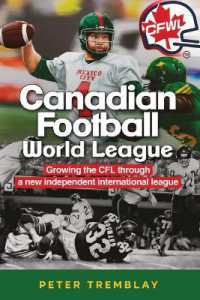- ホーム
- > 洋書
- > 英文書
- > Politics / International Relations
Full Description
Elgar Research Agendas outline the future of research in a given area. Leading scholars are given the space to explore their subject in provocative ways, and map out the potential directions of travel. They are relevant but also visionary.
This Research Agenda explores the academic field of intelligence studies and how it is developing into an increasingly international and diverse area of study.
As more governments release records, and as new generations of scholars engage with the topic from a range of perspectives, the book considers how the field is becoming richer, wider, and more global in scope. Featuring contributions by a diverse range of leading intelligence scholars, it surveys a variety of core areas in, and approaches to, the study of intelligence - including technological perspectives, gender, deception, and the 'deep state' - highlighting how intelligence will become a greater feature of government and security in the future. Taking an interdisciplinary approach, the book explores not only the established elements of intelligence studies, but analyses the cutting edge of intelligence research and proposes an agenda for the continued development of the field.
Offering concise and accessible discussions of developing topics in intelligence studies, this Research Agenda will be a useful guide for scholars and students of public policy, international relations and security. It will also be of interest to professionals engaged in research into security and intelligence matters.
Contents
Contents:
1 Introduction to A Research Agenda for Intelligence
Studies and Government 1
Robert Dover, Huw Dylan and Michael S. Goodman
PART I EMERGING RESEARCH TRENDS IN
INTELLIGENCE STUDIES
2 Critical Security and Intelligence Studies 9
Claudia Aradau and Emma McCluskey
3 Culture in Intelligence Studies 21
Simon Willmetts
4 Equality, Diversity and Inclusion in Intelligence Studies 35
Huw Bennett and Claudia Hillebrand
5 AI and Ethics in Intelligence 49
Sarah Mainwaring
6 Intelligence Leadership 63
Patrick F. Walsh
PART II THE GAPS IN OUR UNDERSTANDING
7 Intelligence and Biosecurity 79
Filippa Lentzos
8 Global Intelligence Studies 93
Daniela Richterova
9 Private Sector Intelligence 103
Damien Van Puyvelde and Sonia Sangiovanni
10 The Impact of Technology on Intelligence Analysis 113
Kathleen M. Vogel
PART III REFRAMING INTELLIGENCE STUDIES
11 Why Intelligence Analysts Need to Write Long Papers 127
Tim Dickens
12 Deception and Intelligence in Peace and War 141
Gary Buck and Huw Dylan
13 The Deep State: Definitional Debates and Impacts 155
Robert Dover
14 Teaching Intelligence: Decolonisation, (Distance)
Education and the Global Student 167
Helen Dexter
15 Post-Modern Archival Research 181
Berenice Burnett
Bibliography 193
Index








